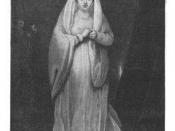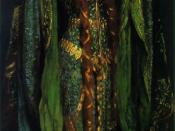The Punishment of the "Unsexed" Woman in Macbeth In A Room of Her Own, Virginia Woolf gives a quotation from a newspaper of 1928: "...female novelists should only aspire to excellence by courageously acknowledging the limitations of their sex." It is quite obvious that, not so much things changed since Shakespeare wrote Macbeth, in which it is easy to see the same assumed limitations. But, what are these limitatiýns and what happens when they are trespassed; are what I will discuss in my essay.
In the play the heroine, Lady Macbeth, wants to be "unsexed": ....Come, you spirits That tend on mortal thoughts, unsex me here.
(Macbeth, I.v.40-41) Come to my woman breasts, And take my milk for gall.
(Macbeth, I.v.46-47) She "consciously attempts to reject her feminine sensibility and adopt a male mentality because she perceives that her society equates feminine qualities with weakness." The examples of weak feminine thought are wide-spread throught the play, in caracters' words and actions; especially in Macduff's.
When he learns his family's sorrowful end, he says, tears make him "play the woman" ( IV.iii.230), and responded by Malcolm, to "dispute it like a man" (IV.iii.220). Women are also defined as "dependent, non-political, incapable of dealing with violence": the words Macduff can say about the murder are not for a "woman's ear" ( II.iii.84-86). He also "refuses to share his political life with his wife, instead, he leaves for England without a word to her" and presents his nation's women to Malcolm with these words: But fear not yet To take upon you what is yours (Macbeth, IV.iii.69-70) The "acceptable" woman is Oftener upon her knees than on her feet Died everyday she lived" (Macbeth IV.iii.110-111) as Macduff approves of Malcolm's mother. These examples which are possible to multiply, show that, "in a society in which femininity is divorced from strength and womanliness is equated with weakness.... the strong woman finds herself.... forced to reject her own womanliness." to be the "fierce and terrible instigator of murder."As Sinfield puts it, "Strength and determination in women, it is believed, can be developedonly at a cost, and their eventual failure is at once inevitable, natural, a punishment, and a warning." So Shakespeare punishes Lady Macbeth, who knows not "what it is to invite sexing", in a very merciless way because of "unaccepted face", namely because of disobeying her social role.
After being "unsexed", she becomes "the most commanding and perhaps the most aweinspiring figure that Shakespeare drew." However, it reveals in the following scenes that, she still carries the "feminine weakness.... which account for her later failure", as in her words about Duncan; that, she'd kill him if "had he not resembled" (II,ii,13-14) her father.She transgresses the limits thought for her; for all women; thus, punishment and pain begins for her. First strike comes from Macbeth, who does not need her encouragements anymore; she is no longer his "dearest partner of greatness" (I.iv.10), she is now "dearest chuck", who must be "innocent of the knowledge" (III.ii.45). Laady Macbeth, who planned in detail and had an important role in realization of the first murder; knows nothing about the others; since the power of action passes to her husband and both of them begin to live in their own world of torments.
She no longer has, neither the qualities of man, nor of woman; she is unsexed, and at the end tries to be a woman again by inviting Macbeth to bed to perform a womanly performance: You lack the season of all natures, sleep (Macbeth,III.iv.141) Come, give me your hand....To bed, to bed, to bed (Macbeth,III.iv.141) Lady Macbeth, who can "dash out the brains" (I.vii.56) of a child on account of her swear, is punished with being sterile; because of being "unsexed", she can't have a child; and, that increases her loneliness. There is a "condign punishment in the fact that Lady Macbeth, who has repeatedly refused to share her husband's visions, finally has no mate or friend to share her own." Naturally, this loneliness gives her the chance, if we can call it so, to think about the past; while in the earlier parts she thinks and does at the same moment. This period of thinking makes her remember all the bloody deeds she had a role in.
Lady Macbeth is tortured with what she despised Macbeth with: The blood, of which she at first thinks " little water clears" (II.ii.67), becomes a blood which has a smell that "all the perfumes of Arabia will not sweeten"(V.i.50). She is also very uneasy with the thoughts, which she warned Macbeth about: These deeds must not be thought After these ways; so, it will make us mad (Macbeth,II.ii.25-26) And at the end, these tortures press upon her so much that, she demands death, which is in accordance with her words: 'Tis safer to be that which we destroy Than by destruction dwell in doubtful joy (Macbeth,III.ii.6-7) As a conclusion, it is reasonable, I think, to agree what Sinfield says: "There is no essential woman or man, but there are ideas of women and men and their consciousness, and these appear in representations", as I tried to show with discussing the way Shakespeare punishes Lady Macbeth.
BIBLIOGRAPHY 1. Alan Sinfield, 'When Is a Character Not a Character? Desdemona, Olivia, Lady Macbeth and Subjectivity', in Faultliness Cultural Materialism and the Politics of Dissident Reading, Oxford:Calenderon Press,1992.
2. Paul A. Jorgensen, Our Naked Frailties, Berkeley:University of California Press, 1971.
3. A. C. Bradley, Shakespearean Tragedy, New York: Macmillan Press.
1904.
4. Virginia Woolf, A Room of One's Own, London: Penguin, 1991.
5. Carolyn Asp, 'Be Bloody, Bold and Resolute: Tragic Action and Sexual Stereotyping in Macbeth' in Macbeth Critical Essays, New York: Garland Publishing, 1991.
6. Marvin Rosenberg, The Masks of Macbeth, Berkeley: University of Delaware Press, 1978.
7. Frank Kermode, 'Macbeth', in The Riverside Shakespeare, Atlanta: Houghton Mifflin Company,1974.





